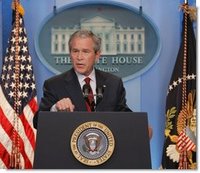Did he really say that?

I don’t know why I had nothing better to do on the morning of July 12 than watch the President’s Press Conference, but somehow it so transpired. After that, I did have better things to do for several days, but always in the back of my mind was the question, “Did he really say that?” So now, a week later, I can report that he really did. Here are two non-consecutive questions with the President’s answers:
Q Thank you, sir. You have spoken passionately about the consequences of failure in Iraq. Your critics say you failed to send enough troops there at the start, failed to keep al Qaeda from stepping into the void created by the collapse of Saddam’s army, failed to put enough pressure on Iraq’s government to make the political reconciliation necessary to keep the sectarian violence the country is suffering from now from occurring. So why should the American people feel you have the vision for victory in Iraq, sir?
THE PRESIDENT: Those are all legitimate questions that I’m sure historians will analyze. I mean, one of the questions is, should we have sent more in the beginning? Well, I asked that question, do you need more, to General Tommy Franks. In the first phase of this operation, General Franks was obviously in charge, and during our discussions in the run up to the decision to remove Saddam Hussein after he ignored the Security Council resolutions. My primary question to General Franks was, do you have what it takes to succeed? And do you have what it takes to succeed after you succeed in removing Saddam Hussein? And his answer was, yes. Now, history is going to look back to determine whether or not there might have been a different decision made. But at the time, the only thing I can tell you, Wendell, is that I relied upon our military commander to make the proper decision about troop strength. And I can remember a meeting with the Joint Chiefs, who said, we’ve reviewed the plan. I remember — and seemed satisfied with it. I remember sitting in the PEOC, or the Situation Room, downstairs here at the White House, and I went to commander and commander that were all responsible of different aspects of the operation to remove Saddam. I said to each one of them, do you have what it takes? Are you satisfied with the strategy? And the answer was, yes.
Q Good morning, Mr. President. Given the events on the ground in Iraq and the politics here at home, has U.S. military deployment to Iraq reached the ceiling, or can you allow any further military escalation?
THE PRESIDENT: There’s going to be great temptation to — not “temptation,” you won’t be tempted, you will actually ask me to speculate about what David Petraeus will talk to us about when he comes home. And I just ask the American people to understand that the Commander-in-Chief must rely upon the wisdom and judgment of the military thinkers and planners. It’s very important that there be that solid connection of trust between me and those who are in the field taking incredible risk. And so, Ed, I’m going to wait to see what David has to say. I’m not going to prejudge what he may say. I trust David Petraeus, his judgment. He’s an honest man. Those of you who have interviewed him know that he’s a straight shooter, he’s an innovative thinker. I was briefed by members of the CODEL that came back, that said that it appeared to them that our troops have high respect for our commanders in Baghdad, as do I.
Can you believe it? Question One: Why didn’t you send in enough troops in the beginning?
Answer: I relied on my generals to tell me what to do.
Question Two: Given events on the ground, do you have enough troops now or might you need more?
Answer: I will rely on my generals to tell me what to do.
So he relied on his generals and the result was a fiasco, nevertheless he will still rely on them to make his decisions.
We hear the refrain, “decisions should be made by the military commanders not politicians in Washington.” But the Constitution puts politicians in charge and there’s good reason for it. Generals, theoretically, know how to fight battles, but politicians are the people we choose to make decisions based on much more than military considerations. We don’t ask generals to know the complicated history of the Middle East or the nature of the tensions between Shias and Sunnis or what the possibilities are of creating a liberal democracy for a country riven by sectarian strife. These decisions need to be made by politicians who have that sort of broad understanding. Lacking that kind of leadership, we leave the generals to do what generals do – and the killing continues.
 Christopher L. Webber
Christopher L. Webber